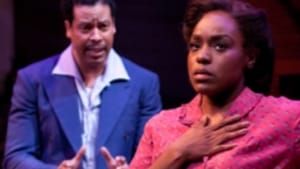Stay in the Loop
BSR publishes on a weekly schedule, with an email newsletter every Wednesday and Thursday morning. There’s no paywall, and subscribing is always free.
We are the world: Post-war, but pre-Civil Rights
Wilson's "Seven Guitars' at People's Light

August Wilson devoted much of his career to a series of ten plays, each depicting the lives of black Americans in a different decade of the 20th Century. Seven Guitars is set in 1948, a watershed period: America has just won World War II and dominates the world politically and economically as no nation ever has. The birth of the Civil Rights movement is just a few years away. Yet for the black residents of Pittsburgh's Hill District (where Wilson was born and raised), each day presents a struggle to keep body and soul together.
Seven Guitars takes place in the backyard of a house shared by several people, including Floyd, a blues guitarist, just released from jail, who unexpectedly cuts a hit record and has been offered a record deal in Chicago. He's eager to right his past wrongs, reform his band and return to Chicago to resume his career.
He wants to persuade his girlfriend, Vera, to join him on the journey. But his methods of correcting the past turn out to be fatally off base.
Others in the house include Louise, a middle-aged woman who was abandoned by her man years ago but nevertheless maintains a positive outlook; Ruby, her niece, whom Louise has taken in; and Hedley, an imbalanced elderly man given to apocalyptic monologues about life, death and the black man's place in the world.
Like band instruments
The house, of course, is a microcosm of the larger world. The "seven guitars" of the title refer to the play's seven characters, and in fact they riff off of one another like instruments in a blues band. Wilson's dialogue is swift and lyrical as these people reveal their ambitions, resentments and fears over the course of three compelling hours.
Under Jade King Carroll's fluent direction, the ensemble cast is uniformly brilliant. Morocco Omari uses his willowy body language and a sly Denzel Washington smile to convey Floyd's charm, pride and arrogance. (Wilson cleverly employs roosters as a metaphor throughout the play.)
Maechi Aharanwa brings out the poignancy in Vera, a fundamentally levelheaded woman hopelessly attracted to the wrong man. Melanye Finister makes a charismatic Louise, and Nyahale Allie is affecting as Louise's big-hearted albeit irresponsible niece. As Hedley, Lou Ferguson hits the rights notes in what could easily be an over-the-top performance in lesser hands.
Rickety steps
Capably rounding out the case as Floyd's musical colleagues are Brian Anthony Wilson as Red, a big, affable drummer, and Francois Battiste as Canewell, a charmer who harbors feelings for Vera.
Everything seems right in scenic designer Alexis Distler's urban backyard set, from the rundown bricks to the rickety steps to the lamplight that comes up in the windows as the day ends.
This production is something not all that common in regional theater: a very fine play brought to life by a cast whose artistry matches the playwright's.
Seven Guitars takes place in the backyard of a house shared by several people, including Floyd, a blues guitarist, just released from jail, who unexpectedly cuts a hit record and has been offered a record deal in Chicago. He's eager to right his past wrongs, reform his band and return to Chicago to resume his career.
He wants to persuade his girlfriend, Vera, to join him on the journey. But his methods of correcting the past turn out to be fatally off base.
Others in the house include Louise, a middle-aged woman who was abandoned by her man years ago but nevertheless maintains a positive outlook; Ruby, her niece, whom Louise has taken in; and Hedley, an imbalanced elderly man given to apocalyptic monologues about life, death and the black man's place in the world.
Like band instruments
The house, of course, is a microcosm of the larger world. The "seven guitars" of the title refer to the play's seven characters, and in fact they riff off of one another like instruments in a blues band. Wilson's dialogue is swift and lyrical as these people reveal their ambitions, resentments and fears over the course of three compelling hours.
Under Jade King Carroll's fluent direction, the ensemble cast is uniformly brilliant. Morocco Omari uses his willowy body language and a sly Denzel Washington smile to convey Floyd's charm, pride and arrogance. (Wilson cleverly employs roosters as a metaphor throughout the play.)
Maechi Aharanwa brings out the poignancy in Vera, a fundamentally levelheaded woman hopelessly attracted to the wrong man. Melanye Finister makes a charismatic Louise, and Nyahale Allie is affecting as Louise's big-hearted albeit irresponsible niece. As Hedley, Lou Ferguson hits the rights notes in what could easily be an over-the-top performance in lesser hands.
Rickety steps
Capably rounding out the case as Floyd's musical colleagues are Brian Anthony Wilson as Red, a big, affable drummer, and Francois Battiste as Canewell, a charmer who harbors feelings for Vera.
Everything seems right in scenic designer Alexis Distler's urban backyard set, from the rundown bricks to the rickety steps to the lamplight that comes up in the windows as the day ends.
This production is something not all that common in regional theater: a very fine play brought to life by a cast whose artistry matches the playwright's.
What, When, Where
Seven Guitars. By August Wilson; Jade King Carroll directed. Through October 7, 2012 at People’s Light & Theatre Company, 39 Conestoga Road, Malvern, Pa. (610) 644-3500 or www.PeoplesLight.org.
Sign up for our newsletter
All of the week's new articles, all in one place. Sign up for the free weekly BSR newsletters, and don't miss a conversation.
